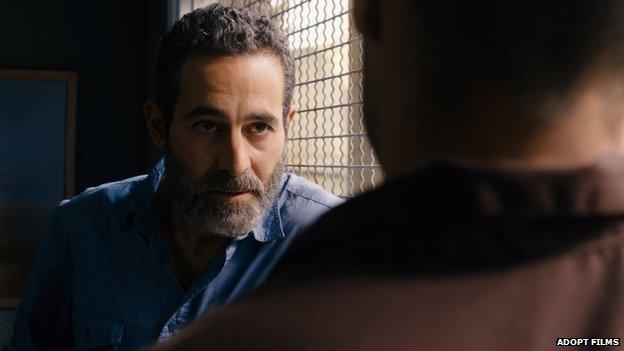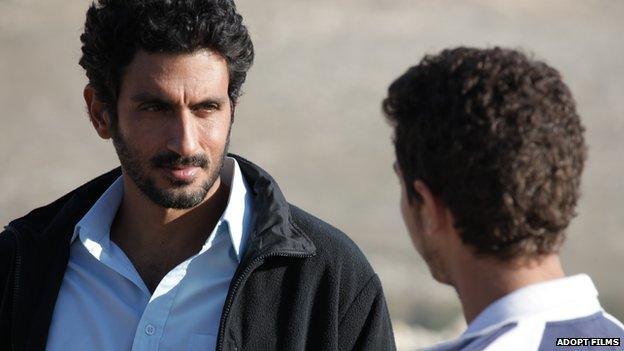Collaborator film puts Palestinians in Oscars frame
- Published
Omar won the Jury Prize in the Un Certain Regard section at the Cannes Film Festival, 2013
The Palestinian film Omar brings the complexities of the conflict with Israel to this year's Academy Awards.
Nominated in the best foreign language category, it raises the highly sensitive issue of Palestinian collaborators.
The movie follows the difficult choices that the title character, a young Palestinian baker, must make after he is involved in the killing of an Israeli soldier and Israeli intelligence agents pressure him to work with them.
Omar's relationships with the girl he loves, his childhood friends and family are all placed in jeopardy.
"It's a love story but it's also about trust and betrayal under [Israeli] occupation," says director, Hany Abu Assad, who is in Los Angeles for Sunday's awards ceremony.
"I'm looking at how people behave under extreme, unnatural circumstances."
"Recruiting people to collaborate is kind of a taboo subject and I felt like it was time to open it up because it's very important," he goes on.
"Not only does it destroy the Palestinian resistance but it also destroys people as human beings. It's a huge crime in my opinion."
The complicated interactions between Omar and his Israeli handler, Rami are at the centre of the plot.
"I think the dynamics between Omar and Rami build up really well," says actor, Eyad Hourani.
"Omar needs to leave prison to solve his problems and work out who betrayed his friends. All Rami wants is information about who killed the soldier and my character. Each depends on the other for his own self interest."

In the film Omar, the title character is pressured into giving information to Israeli intelligence
Over the decades, Israel's security forces have relied on information from thousands of Palestinian collaborators.
Some have been recruited through coercion and in exchange for money, travel permissions, or medical treatment. Others work for Israel for ideological reasons.
The risks can be extremely high: collaborators can be disowned by their families and are sometimes killed.
They are hate figures in Palestinian society.
Often the only option when they are discovered is to move to Israel, where they live out a precarious existence.
'One-way ticket'
Rjoub Abdul Khadr from Hebron in the occupied West Bank began working for Israel's Shin Bet internal security service nearly 30 years ago.
A relative of a senior Palestinian official and former member of the Fatah faction, he tells me he became an informant of his own accord when he was held in an Israeli jail.
"I stopped believing that victory for the Palestinian people was necessary," Mr Abdul Khadr says.
"I believed that the state of Israel was a permanent fact and that I was in a minority who could live in its shadow. I flipped from one side to the other."
For the most part he is proud of his actions.
"I saved a lot of lives and I put my own life in danger because of it. I don't know how to estimate it, but I know that I was a prized security asset for Israel," says Mr Abdul Khadr.
However he reflects that he might not make the same choices if he could live his life over again. He describes the decision to become a collaborator as a "one-way ticket" and says there was a high personal toll.

Rjoub Abdul Khadr says he was a "prized security asset" for Israel
He now lives and works in Israel with his wife and some of his children but is unable to return to the West Bank.
"I'm cut off from my family and society. I'm a lonely person. I'm completely erased from all family events and parties," Mr Abdul Khadr says.
"My mother died and I couldn't see her body to say goodbye. My brother died, I couldn't see him. My daughter got married and I couldn't be at the wedding. What kind of a feeling is that?"
Moral dilemmas
Many Palestinian informants also complain that they are not given adequate protection, a proper status and financial assistance when they move to Israel.
They feel abandoned by the security establishment.
Lawyers say part of the problem is that there is no formal definition in Israel of who a collaborator is and what their rights are.
"Promises are made to these collaborators about their quality of life but in practice the state of Israel doesn't know how to receive and embrace them," says Natan Shryber who represents dozens of former Palestinian informants.
"There's a lot of disappointment."
The divided loyalties and moral dilemmas that make collaborating painful to discuss in real life make for gripping drama on the big screen.
The Oscar nomination for Omar has helped open up the subject to an international audience.
However it is not the only recent movie to do so.
The Israeli thriller, Bethlehem, which has won prizes at European film festivals, is also about a Palestinian teenage informant and his Israeli handler.

The Israeli film Bethlehem touches on the same issue of Palestinian collaborators.
Roni Shaked, who used to work as a handler of collaborators in Shin Bet, Israel's domestic security service, praises both movies.
"First of all it's a reality," he says. "In every conflict, you need people who are going to give you information. The way to control terrorism is just by information. Without the collaborator - I prefer to call them the agents - we are blind. We will not know where to go or how.
"The movies, especially the movie made by the Palestinians [Omar], put a mirror to Palestinian society."
Hany Abu Assad, who is from Nazareth in northern Israel, says he has had mixed reviews to his film from Israeli audiences.
However he has been pleased by the response from Palestinians. "Ninety-nine per cent of the reactions of Palestinians are very positive," he says.
"They felt good after the movie - not in the sense that there was a happy ending. But they felt it was worthwhile to watch the film. They lived through this experience and they went out with hope and dignity."